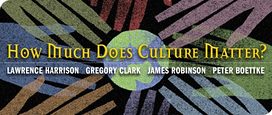Lawrence Harrison doesn’t have a hypothesis about culture and economic development. He has a hypothesis about the interaction between culture and institutions. Though he is not clear about this, this is what his argument implies, and this is the only thing that could explain why Chinese people have a good culture, yet China is extremely poor, and why the supposedly beneficial Chilean culture only became apparent in terms of economic performance after 1985.
This might be right, though I doubt it. How could one know if it were right? Not by quoting various authorities. The way we try to discover if a hypothesis is right in social science is to test it. To do so we’d need to be much more specific about how to conceptualize and measure culture. In my first reply I tried to raise this issue but the proponents of the cultural hypotheses seem to be remarkably uninterested in measurement and testing. They seem content with vague concepts, and untested arguments. I think this is why Greg Clark maintains that there has been so little progress on this topic and I agree with him. In the long list of books Lawrence Harrison mentioned I think that the one by my colleague Robert Putnam is the only one with a serious empirical analysis. Yet, though I like this book immensely, there are huge problems in using the data to identify a causal effect of culture on democracy and economy. Indeed, it was these problems that Guido Tabellini tried to address in his important paper, though my feeling is that he did not do so in a satisfactory way. I should add however that the sense in which Putnam talked about culture, or “social capital” is far from the emphasis on values and beliefs which Lawrence Harrison started out using as definitions of culture.
This lack of conceptual clarity is manifest in Stephen Lewis’ discussion of Botswana. I enjoyed these comments a lot, and I personally have learned a lot from Stephen Lewis’ work–he wrote a seminal study of economic policy in Botswana–and from him in person. He pointed out that at one level there was not much of a difference between the cultural and institutional interpretations of Botswanan success, but I think this reflects the fact that “culture” is used in very vague ways. I think I can describe what was important about the political institutions of the Tswana states and how this influenced the ways political elites behaved, though I admit there are many things I do not understand. This may be isomorphic to a claim about Tswana culture, but I find the latter much harder to measure or conceptualize.

